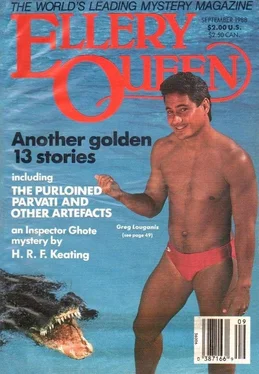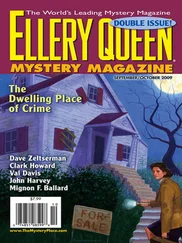William Bankier - Ellery Queen’s Mystery Magazine. Vol. 92, No. 3. Whole No. 547, September 1988
Здесь есть возможность читать онлайн «William Bankier - Ellery Queen’s Mystery Magazine. Vol. 92, No. 3. Whole No. 547, September 1988» весь текст электронной книги совершенно бесплатно (целиком полную версию без сокращений). В некоторых случаях можно слушать аудио, скачать через торрент в формате fb2 и присутствует краткое содержание. Город: New York, Год выпуска: 1988, Издательство: Davis Publications, Жанр: Детектив, на английском языке. Описание произведения, (предисловие) а так же отзывы посетителей доступны на портале библиотеки ЛибКат.
- Название:Ellery Queen’s Mystery Magazine. Vol. 92, No. 3. Whole No. 547, September 1988
- Автор:
- Издательство:Davis Publications
- Жанр:
- Год:1988
- Город:New York
- ISBN:нет данных
- Рейтинг книги:5 / 5. Голосов: 1
-
Избранное:Добавить в избранное
- Отзывы:
-
Ваша оценка:
- 100
- 1
- 2
- 3
- 4
- 5
Ellery Queen’s Mystery Magazine. Vol. 92, No. 3. Whole No. 547, September 1988: краткое содержание, описание и аннотация
Предлагаем к чтению аннотацию, описание, краткое содержание или предисловие (зависит от того, что написал сам автор книги «Ellery Queen’s Mystery Magazine. Vol. 92, No. 3. Whole No. 547, September 1988»). Если вы не нашли необходимую информацию о книге — напишите в комментариях, мы постараемся отыскать её.
Ellery Queen’s Mystery Magazine. Vol. 92, No. 3. Whole No. 547, September 1988 — читать онлайн бесплатно полную книгу (весь текст) целиком
Ниже представлен текст книги, разбитый по страницам. Система сохранения места последней прочитанной страницы, позволяет с удобством читать онлайн бесплатно книгу «Ellery Queen’s Mystery Magazine. Vol. 92, No. 3. Whole No. 547, September 1988», без необходимости каждый раз заново искать на чём Вы остановились. Поставьте закладку, и сможете в любой момент перейти на страницу, на которой закончили чтение.
Интервал:
Закладка:
Donoghue set Bothwell’s report to one side and picked up the report submitted by Jean Kay of the Forensic Science Laboratory. Donoghue knew Jean Kay well and liked her. She was a small, wiry woman in her sixties and held a Ph.D. in Chemistry from one of Britain’s leading universities, Donoghue could not recall which one. Her reputation and the reputation of the laboratory she ran were such that her services were unashamedly sought by the police forces of the Highlands and Islands region, the Tayside and Grampian forces, the Central force, and the Dumfries and Galloway police. Only the professionally competitive Lothian and Borders force showed any reluctance to approach her.
Her report, as befitted a woman of her learning, was fuller than Bothwell’s but nevertheless gave Donoghue very little to go on. All the blood on the clothing was AB negative, the blood group of the deceased. If the attacker was wounded and bled in the affray, then he by sheer coincidence must also be blood group AB negative. But, she concluded, the balance of probability was that all the blood came from the deceased. There was little to identify the button which had apparently been found in the hand of the deceased, but it was not a part of the clothing worn by the deceased at the time of death. The deceased had obviously bled profusely, the attack had been carried out by a knife, as indicated by the slashing of the clothing. She expected the pathologist might have more to say on the matter, but she was certain the attacker must have left the locus of the offense well covered with his victim’s blood. It would have been a conspicuous site, she thought, on a Sunday afternoon in the middle of summer. She regretted, in a single-line paragraph, that she could not have been of greater assistance.
The phone on Donoghue’s desk rang. He took the pipe from his mouth and propped it in the huge black ashtray on his desk. He picked up the receiver and, turning to a blank page in his notepad, said, “D.I. Donoghue.”
“Reynolds here,” said the calm voice on the other end of the line.
“Yes, sir.”
“I’ve completed the postmortem.” Reynolds spoke unhurriedly. “Death was caused by stab wounds. One wound particularly pierced the aorta but any of half a dozen others could have killed him.”
“I see.” Donoghue wrote on his pad.
“The weapon in question seems to be about five inches long, but wider than a kitchen knife.”
“Like a commando knife?”
“That sort of thing, yes. He sustained seventeen wounds in all, all to the anterior of the torso.”
“The front of the chest.”
“Yes. Nothing below the waist or above the shoulders. Six wounds were particularly penetrating and deadly. He was a well nourished man, unlike most of our profession.”
“Oh?”
“Well, you know what they say — an alcoholic is someone who drinks more than his doctor. There’s a lot of truth in jest. We are a notoriously alcoholic profession, but Hugo Skillicorn had a very healthy liver and kidneys. There’s really nothing else I can add. My report will be typed up and sent over to you as soon as possible.”
Donoghue thanked him and replaced the receiver. He picked up his pipe from the ashtray and held it by its stem as he scraped the bowl with his penknife. Then he pulled the stem apart and cleaned the interior with a pipe cleaner, wincing at the oily nicotine and tar that had accumulated. He refilled the bowl with a plug of the special mixture he had made up for him by a city tobacconist: a Dutch base for taste, with a twist of dark shag for depth of flavor and a slower burning rate. He placed the flame of his gold-plated lighter over the bowl and drew lovingly on the smoke. Now where do we go? he thought.
On the thirteenth of May, 1568, a Scots army under Mary Queen of Scots was defeated by another Scots army commanded by the regent, James Stewart, Earl of Moray. Battle was joined in a field south of the Clyde, close to the River Cart near the small town of Glasgow. The site of the battle was later appropriately named Battlefield. Glasgow expanded in the Nineteenth Century — “exploded” may be the better word — and the site of the battle was built over. Closely packed tenements for the new middle classes spread over the scene of the earlier carnage, and the new district of the city retained the name of Battlefield. In the center of the new housing on the hill called Battlefield Road, and adjoining Battle Place with the monument, a hospital was built. It was named the Victoria Infirmary in honor of the reigning monarch, who by then was Queen of both Scots and English.
Ray Sussock turned off Battlefield Road and parked his car on Langside Road. He left the window of his car slightly open to allow the interior to ventilate in the heat and then walked, enjoying the day, to the administrative block of “the Vicky.”
“Detective Sergeant Sussock,” he said to the receptionist, and showed his I.D. The receptionist was a handsome man, and a little smug because of it, thought Sussock. He nodded to Sussock a grudging acknowledgment of rank and Sussock enjoyed the young man’s confusion — respect for a cop, contempt for an old man of shabby, untidy appearance. “Yes, sir?” he said.
“I have an appointment with Dr. Paxton.”
The receptionist turned to the phone and dialed an internal number. It was an old telephone system of heavy black bakelite and Sussock distinctly heard the solid burr, burr as the phone rang at the other end of the line. He fancied that even at this distance he would be able to hear both sides of the conversation. He wasn’t disappointed.
“Porter’s lodge,” said the receptionist. “There’s a Detective Sergeant Sussock here to see Dr. Paxton.”
“Wait a minute. — Yes, he’s expected. Ask him to come up, please, and someone will meet him.”
“Okay.” The receptionist turned to Sussock. “If you’d like to take the lift to the fourth floor, sir—”
“Someone will meet me,” said Sussock. “Thank you.”
The lift, like the telephone system, was the original, the first to be installed and still providing sterling service, with brass telescoping doors and solid wood paneling smelling strongly of polish. Sussock pressed the button marked 4. The lift hesitated for a moment and then began a slow, uneven ascent. It slowed to a stop, then jerked up another six inches, and only then did the light behind the figure 4 above the door shine on. Sussock wrenched open the lift door, then the shaft door, and shut both behind him.
A nurse in a starched white smock stood in the corridor, which smelled of disinfectant. The tall windows allowed the interior of the hospital to flood with light and permitted an impressive view of the rooftops of Battlefield and Langside. Sussock saw an orange bus go down Battlefield Road, and away in the far, far distance the sun caught a window of a house, causing it to gleam penetratingly, like a diamond in a sea of granite and concrete.
“Mr. Sussock?” said the nurse. Sussock found her demure and genuinely respectful, not just of him as a cop but of him as a human being. She immediately brought out his sense of protectiveness. He nailed felons to protect citizens like this nurse.
“Yes.” He smiled.
“If you’d like to step this way, sir. Dr. Paxton is expecting you.”
Sussock followed her down the corridor, at her side, half a step behind. She didn’t talk, and Sussock felt that, like the children who were brought up in the era that the Victorian Infirmary was built, she would speak only if spoken to. The walk down the corridor was long, and silent save for his footfall. Like all nurses, she wore soft-soled shoes and made no sound as she walked.
They came to a ward. In an anteroom near the entrance, a middle-aged man sat at a desk. The nurse stopped at the door and said, “Mr. Sussock, sir.”
Читать дальшеИнтервал:
Закладка:
Похожие книги на «Ellery Queen’s Mystery Magazine. Vol. 92, No. 3. Whole No. 547, September 1988»
Представляем Вашему вниманию похожие книги на «Ellery Queen’s Mystery Magazine. Vol. 92, No. 3. Whole No. 547, September 1988» списком для выбора. Мы отобрали схожую по названию и смыслу литературу в надежде предоставить читателям больше вариантов отыскать новые, интересные, ещё непрочитанные произведения.
Обсуждение, отзывы о книге «Ellery Queen’s Mystery Magazine. Vol. 92, No. 3. Whole No. 547, September 1988» и просто собственные мнения читателей. Оставьте ваши комментарии, напишите, что Вы думаете о произведении, его смысле или главных героях. Укажите что конкретно понравилось, а что нет, и почему Вы так считаете.












